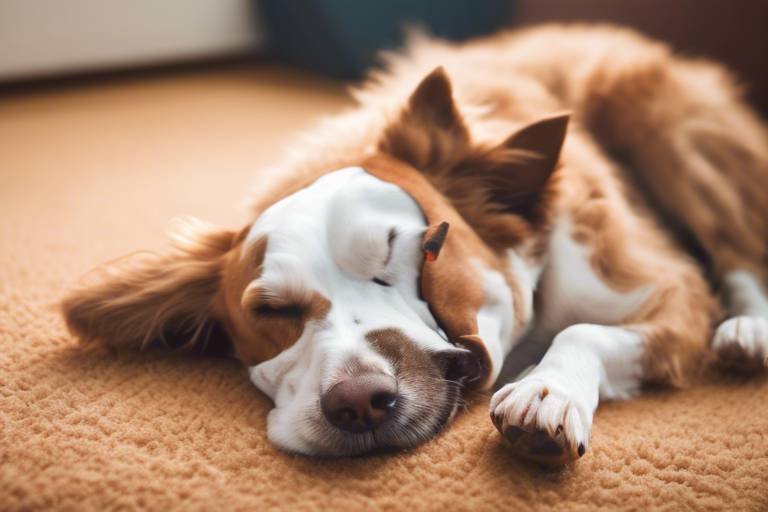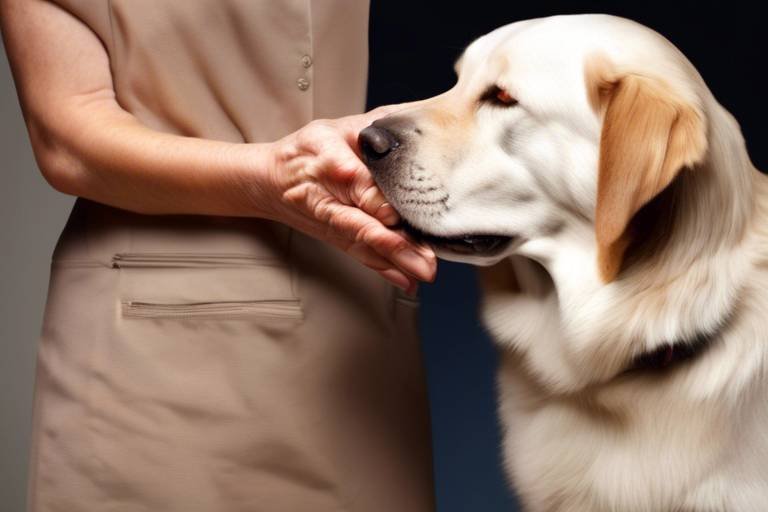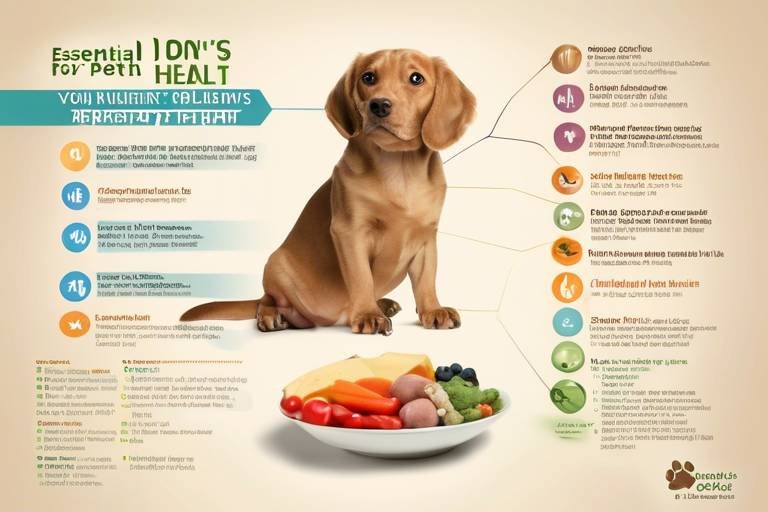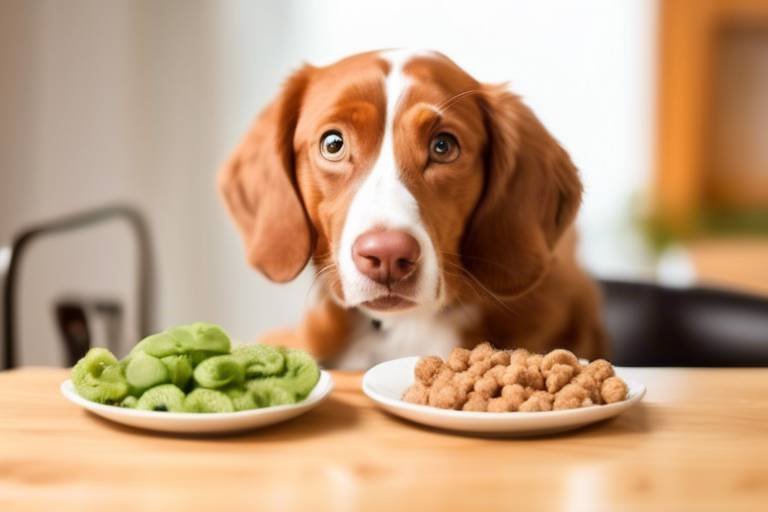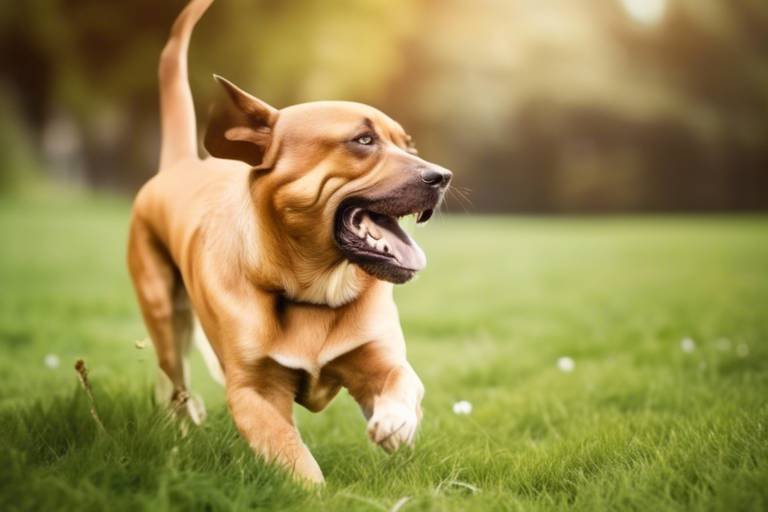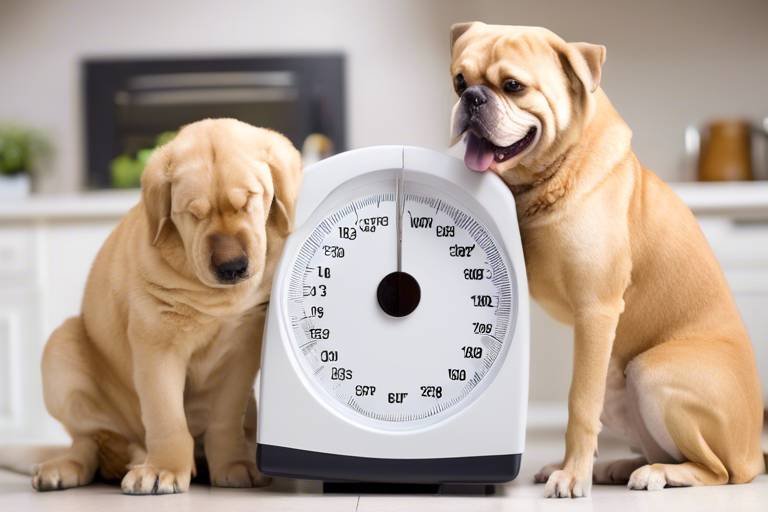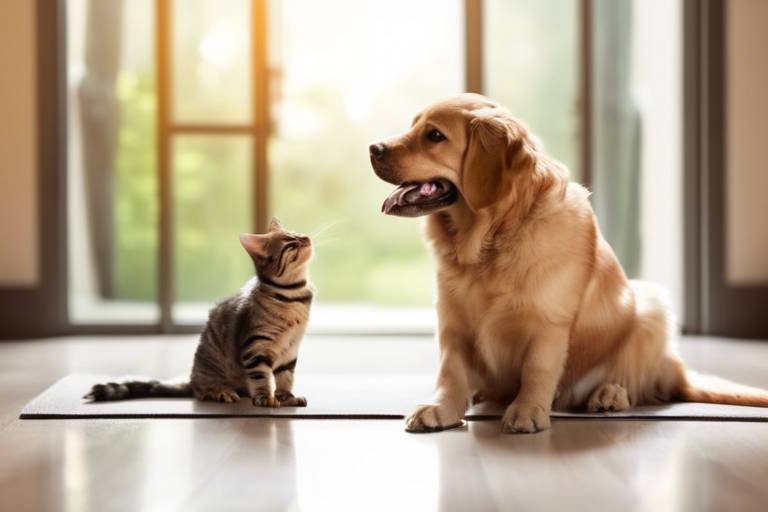How to Support Your Pet’s Digestive Health
As pet owners, we often find ourselves worrying about our furry friends' health, and one of the most critical aspects to keep an eye on is their digestive health. Just like us, pets can experience a range of digestive issues that can affect their overall well-being. So, how can you support your pet's digestive health? It’s all about understanding their needs, recognizing the signs of distress, and making informed choices about their diet and lifestyle.
First and foremost, it’s essential to recognize that a healthy digestive system is the backbone of your pet's vitality. Think of it as the engine that powers their body, allowing them to absorb nutrients and maintain energy levels. If that engine is running poorly, everything else can suffer. Proper digestion not only helps in nutrient absorption but also plays a significant role in your pet's immune system and emotional health. Just as we feel sluggish and irritable when our stomachs are upset, our pets can also experience mood changes when their digestive systems are out of whack. Therefore, ensuring that your pet's digestion is functioning optimally is crucial for their happiness and longevity.
Now, you might be wondering, what are the signs that indicate my pet might be facing digestive issues? It's essential to be vigilant and look out for common symptoms such as vomiting, diarrhea, or changes in appetite. These signs can often be the first indicators that something isn’t right. For instance, if your dog suddenly refuses to eat their favorite kibble or if your cat is spending more time than usual in the litter box, these could be red flags. Early detection can be a game changer, so don’t hesitate to consult your veterinarian if you notice anything unusual.
One of the most common issues pet owners face is frequent vomiting or diarrhea. These symptoms can be alarming and may signal underlying health problems. Understanding the potential causes is vital. For example, dietary causes often play a significant role. Certain foods, especially those that are rich in fillers, artificial additives, or allergens, can trigger digestive upset. It’s crucial to identify these culprits to prevent future issues. Additionally, stress factors such as changes in environment or routine can also lead to digestive disturbances. Pets are creatures of habit, and any disruption can cause anxiety that manifests in their digestive system.
So, what can you do to support your pet's digestive health? Taking proactive measures is key. This includes making dietary adjustments, ensuring regular veterinary check-ups, and adopting lifestyle changes that promote better digestion. For instance, consider incorporating high-quality ingredients into their diet, as these can significantly impact their digestive health. Look for pet foods that list real meat as the first ingredient and avoid those with excessive fillers. Portion control is also essential; feeding your pet the right amount based on their size and activity level can prevent overeating and the associated digestive issues.
In conclusion, supporting your pet's digestive health is a multifaceted approach that involves understanding their needs, recognizing signs of distress, and making informed dietary choices. By being proactive and attentive, you can help ensure that your furry friend remains healthy and happy for years to come.
- What are the best foods for my pet's digestive health? Look for high-quality pet food that lists real meat as the primary ingredient, and avoid those with fillers and artificial additives.
- How can I tell if my pet has a digestive issue? Signs include vomiting, diarrhea, changes in appetite, and unusual behavior. Always consult a veterinarian if you notice these symptoms.
- Can stress affect my pet's digestion? Yes, stress can lead to digestive disturbances. It’s important to create a stable environment for your pet and minimize changes that could cause anxiety.
- How often should I take my pet for a vet check-up? Regular check-ups are recommended at least once a year, but consult your vet for personalized advice based on your pet’s health.

Understanding Digestive Health
This article explores essential tips and strategies for maintaining your pet's digestive health, including diet, exercise, and recognizing common digestive issues.
A healthy digestive system is vital for your pet's overall well-being. Just like humans, pets rely on their digestive systems to break down food, absorb nutrients, and eliminate waste. When everything is functioning smoothly, your pet feels energetic, playful, and happy. However, when digestive issues arise, it can lead to a cascade of health problems that can affect their mood, energy levels, and even their lifespan. Think of your pet's digestive health as the engine of a car; if it’s not running well, the whole vehicle can suffer.
Proper digestion plays a crucial role in nutrient absorption. It’s not just about eating; it’s about how well your pet can utilize the food they consume. A well-functioning digestive system ensures that essential vitamins, minerals, and nutrients are effectively absorbed into the bloodstream, supporting everything from a shiny coat to a robust immune system. Poor digestion, on the other hand, can lead to malnutrition, weight loss, and a host of other health issues.
Moreover, digestive health is closely linked to your pet's mental health. Did you know that a significant portion of serotonin—the “feel-good” hormone—is produced in the gut? This means that when your pet's digestive system is out of whack, it can also affect their mood and behavior. A happy gut often leads to a happy pet!
To maintain good digestive health, it’s essential to pay attention to several factors:
- Diet: The food your pet eats is the foundation of their digestive health. A balanced diet rich in high-quality ingredients can promote optimal digestion.
- Hydration: Water is crucial for digestion. Ensure your pet has access to fresh, clean water at all times.
- Exercise: Regular physical activity stimulates the digestive system, helping to keep things moving smoothly.
- Routine Vet Check-ups: Regular veterinary visits can help catch any potential digestive issues early on.
In summary, understanding digestive health is not just about recognizing the signs of distress; it’s about fostering an environment where your pet can thrive. By focusing on their diet, hydration, exercise, and regular vet check-ups, you can ensure that their digestive system remains in tip-top shape. After all, a happy pet is a healthy pet!
Recognizing the signs of digestive problems is crucial for early intervention. This section outlines common symptoms that indicate your pet may be experiencing digestive distress.
Frequent vomiting and diarrhea can signal underlying health issues. Learn about potential causes and when to seek veterinary assistance for your pet’s digestive troubles.
Certain foods can trigger digestive upset in pets. This subsection discusses common dietary culprits and how to identify them to prevent future issues.
Stress can significantly impact your pet's digestion. Explore how environmental changes and anxiety can lead to digestive disturbances and what you can do to mitigate them.
Taking proactive steps can help maintain your pet’s digestive health. This section covers dietary adjustments, regular vet check-ups, and lifestyle changes that promote better digestion.
Selecting an appropriate diet is fundamental to digestive health. Here, we discuss the components of a balanced diet and how to choose the best food for your pet.
Understanding the importance of high-quality ingredients in pet food can lead to better digestive health. This subsection highlights what to look for on pet food labels.
Feeding your pet the right portion sizes is essential for digestion. This section explains how to determine the correct amount of food based on your pet’s size and activity level.
Here are some common questions pet owners have about supporting their pet's digestive health:
- What are the signs that my pet has digestive issues? Look for symptoms like vomiting, diarrhea, loss of appetite, or changes in behavior.
- How can I improve my pet’s diet for better digestion? Focus on high-quality, balanced food and ensure they stay hydrated.
- Is exercise important for my pet’s digestive health? Yes, regular exercise helps stimulate digestion and keeps your pet healthy.
- When should I take my pet to the vet for digestive concerns? If your pet shows persistent symptoms like vomiting or diarrhea for more than a day, it's best to consult your vet.

Signs of Digestive Issues
As a pet owner, it's essential to be vigilant about your furry friend's health. Just like us, pets can experience digestive issues that may lead to discomfort or more serious health problems. Recognizing the signs of digestive distress early on can make a significant difference in their well-being. So, what should you be looking out for? Let's dive into some common symptoms that indicate your pet might be having digestive troubles.
One of the most noticeable signs of digestive issues is vomiting. If your pet is frequently bringing up their food or bile, it could indicate something isn't right. Vomiting can range from a one-time occurrence to a regular issue, and understanding the frequency can help you gauge the severity. Alongside vomiting, diarrhea is another red flag. If your pet's stool is loose or watery, it’s a sign that their digestive system is under stress. In some cases, you might even notice blood or mucus in their stool, which is a clear indication that veterinary attention is needed.
Frequent vomiting and diarrhea can be symptoms of various underlying health issues. For instance, your pet might have eaten something they shouldn’t have, or they may be suffering from an infection. Additionally, parasites can wreak havoc on your pet's digestive system, leading to these uncomfortable symptoms. If you observe these signs persisting for more than a day, it’s crucial to consult your veterinarian. They can diagnose the issue and provide the necessary treatment to get your pet back on track.
One of the most common culprits behind digestive upset is diet. Certain foods can trigger adverse reactions in pets, especially if they are not accustomed to a specific diet. For example, sudden changes in their food or offering them table scraps can lead to gastrointestinal distress. It's essential to identify any dietary triggers that may be affecting your pet. Keeping a food diary can help you track what your pet eats and any subsequent digestive issues that arise. If you notice a pattern, it may be time to consult your vet about a more suitable diet.
Believe it or not, stress can have a significant impact on your pet's digestion. Just like humans, pets can experience anxiety from environmental changes, such as moving to a new home, the arrival of a new pet, or even loud noises. When pets are stressed, their bodies can react in various ways, including digestive disturbances. It's essential to create a calm environment for your pet and recognize the signs of stress. If your pet seems anxious or agitated, consider implementing strategies to help them feel more secure, such as providing a safe space or engaging in calming activities.
In summary, being aware of the signs of digestive issues in your pet can help you take timely action. Regular monitoring of their behavior, eating habits, and overall health will empower you to make informed decisions. If you notice any concerning symptoms, don't hesitate to reach out to your veterinarian for guidance.
- What should I do if my pet is vomiting? - Monitor the frequency and severity of the vomiting. If it persists for more than 24 hours or is accompanied by other symptoms like lethargy, contact your veterinarian.
- How can I tell if my pet's diarrhea is serious? - If diarrhea lasts more than a day, contains blood, or is accompanied by vomiting or lethargy, seek veterinary advice.
- Can stress really affect my pet's digestion? - Absolutely! Stress can lead to digestive disturbances, so it's important to manage your pet's environment and emotional well-being.
Vomiting and Diarrhea
When it comes to our furry friends, are two of the most common signs that something is amiss in their digestive system. Imagine your pet's stomach as a finely tuned engine; when everything is running smoothly, it purrs like a kitten. However, when that engine starts sputtering, it can be a sign of underlying health issues that need immediate attention. Frequent vomiting or diarrhea can lead to dehydration, nutrient deficiencies, and a host of other health problems if not addressed promptly.
So, what could be causing these digestive disturbances? There are numerous potential culprits, ranging from dietary indiscretions to more serious health conditions. For instance, if your pet has gotten into the trash or snuck a bite of your leftover pizza, that could easily upset their stomach. But it’s not always that simple. Infections, parasites, and even certain medications can also lead to these symptoms. It’s crucial to observe your pet closely and consider any recent changes in their diet or environment.
Here are some common causes of vomiting and diarrhea in pets:
- Dietary indiscretion: Eating something they shouldn't, like spoiled food or human snacks.
- Infections: Bacterial or viral infections can wreak havoc on the digestive tract.
- Parasites: Worms and other parasites can lead to gastrointestinal upset.
- Stress: Changes in the household, new pets, or loud noises can trigger anxiety and digestive issues.
If your pet is experiencing these symptoms, it’s essential to monitor their condition closely. Keep an eye on their behavior and overall health. Are they still drinking water? Are they lethargic or acting unusually? If vomiting or diarrhea persists for more than 24 hours, or if you notice blood in their stool or vomit, it’s time to seek veterinary assistance. Remember, early intervention is key to preventing more serious health issues down the line.
In conclusion, while occasional vomiting or diarrhea can happen, frequent occurrences should never be ignored. Your pet depends on you to recognize the signs of distress and take action. Just like a car needs regular maintenance, our pets require our attention and care to ensure their digestive health remains intact. So, keep an eye on their habits, and don’t hesitate to consult your veterinarian if something seems off!
Q: What should I do if my pet is vomiting or has diarrhea?
A: Monitor your pet's condition closely. Ensure they stay hydrated and consult your veterinarian if symptoms persist for more than 24 hours.
Q: Can stress cause digestive issues in pets?
A: Yes, stress can significantly impact your pet's digestive health. Changes in the environment or routine can lead to upset stomachs.
Q: When should I take my pet to the vet for these symptoms?
A: If vomiting or diarrhea lasts more than 24 hours, if there is blood present, or if your pet shows signs of lethargy or dehydration, seek veterinary help immediately.
Dietary Causes
When it comes to our furry friends, their diets play a pivotal role in their overall digestive health. Just like humans, pets can experience digestive upset due to certain foods that they consume. It’s essential to be aware of these to ensure your pet remains healthy and happy. You might be surprised to learn that even the most common ingredients can be culprits in triggering digestive issues!
First off, let’s talk about food intolerances. Some pets may have sensitivities to specific proteins, grains, or additives found in their food. For instance, if your dog has a hard time digesting chicken, switching to a novel protein like lamb or fish might do the trick. Similarly, many cats are lactose intolerant, meaning that dairy products can lead to an upset stomach. Always monitor your pet after introducing new foods to catch any adverse reactions early on.
Another significant factor is the quality of the ingredients in your pet's food. Low-quality pet foods often contain fillers, artificial preservatives, and by-products that can be hard on your pet's digestive system. High-quality pet food should list real meat as the first ingredient and avoid unnecessary fillers. Here’s a quick comparison to illustrate the difference:
| Ingredient Quality | Low-Quality Food | High-Quality Food |
|---|---|---|
| First Ingredient | Meat by-products | Real meat (e.g., chicken, beef) |
| Fillers | Corn, soy, and wheat | Whole grains, vegetables |
| Preservatives | Artificial additives | Natural preservatives (e.g., tocopherols) |
Additionally, sudden changes in diet can wreak havoc on your pet’s digestive system. If you need to switch your pet's food, do it gradually over a week or so, mixing the old food with the new. This gradual transition helps your pet's digestive system adjust without causing stress or discomfort.
Lastly, let’s not forget about table scraps. While it might be tempting to share your meals with your pet, many human foods can be harmful. Foods like chocolate, grapes, and onions are toxic to pets, while others, like fatty foods, can lead to pancreatitis. Always consult your veterinarian before introducing any human food to your pet’s diet.
In summary, being mindful of what goes into your pet's bowl can make a significant difference in their digestive health. By choosing high-quality ingredients, avoiding sudden dietary changes, and steering clear of harmful human foods, you can help your furry friend maintain a happy and healthy digestive system.
- What are the signs my pet is having digestive issues? Look for symptoms like vomiting, diarrhea, bloating, or a decrease in appetite.
- How can I improve my pet's diet? Focus on high-quality ingredients, avoid fillers, and consult your vet for personalized recommendations.
- Is it safe to give my pet human food? Some human foods are safe, but many are not. Always check with your veterinarian first.
Stress Factors
Stress is like a sneaky thief that can rob your pet of their digestive health without you even realizing it. Just think about it: when you're stressed, how often do you feel like your stomach is in knots? Well, the same goes for our furry friends! A pet’s environment plays a crucial role in their overall well-being, and when that environment becomes chaotic or filled with anxiety, it can lead to significant digestive disturbances.
There are several stress factors that can affect your pet's digestion. For instance, changes in their routine, such as moving to a new home, introducing a new family member, or even changes in your schedule can create anxiety for your pet. Additionally, loud noises, such as thunderstorms or fireworks, can cause panic, leading to digestive upset. It's essential to be observant and recognize how these stressors can impact your pet's health.
Moreover, pets are incredibly sensitive to their owner's emotions. If you're feeling anxious or stressed, your pet may pick up on those vibes and feel anxious themselves. This emotional connection can create a cycle of stress that affects both you and your pet. To help mitigate these stress factors, consider the following strategies:
- Provide a Safe Space: Create a designated area in your home where your pet can retreat when they feel overwhelmed. This could be a cozy bed in a quiet corner or a crate that they associate with safety.
- Maintain a Routine: Pets thrive on routine, so try to keep feeding, walking, and playtimes consistent. A predictable schedule can help alleviate anxiety.
- Positive Reinforcement: Use treats and praise to reward calm behavior, especially during stressful situations. This can help build your pet’s confidence and reduce anxiety over time.
Understanding and addressing these stress factors is essential for maintaining your pet's digestive health. If you notice any signs of stress, such as excessive barking, hiding, or changes in eating habits, it may be time to evaluate their environment and make necessary adjustments. Remember, a happy pet is a healthy pet, and by reducing stress, you can help your furry friend enjoy a more balanced digestive system.
1. How can I tell if my pet is stressed?
Look for signs such as excessive barking, hiding, changes in appetite, or destructive behavior. If your pet seems more anxious than usual, it might be time to assess their environment.
2. Can stress really affect my pet's digestion?
Absolutely! Just like humans, pets can experience digestive issues when they are stressed. It's important to identify and mitigate stressors to help maintain their digestive health.
3. What should I do if my pet shows signs of digestive distress?
If you notice symptoms like vomiting or diarrhea, consult your veterinarian. They can help determine if stress is a factor and suggest appropriate treatments.
4. Are there any calming products for pets?
Yes, there are various calming products available, such as anxiety wraps, calming treats, and pheromone diffusers that can help soothe your pet during stressful times.
Preventive Measures
When it comes to your pet's digestive health, prevention is always better than cure. Just like we take care of our own bodies by eating right and staying active, our furry friends deserve the same attention. It’s essential to create a holistic approach that combines dietary adjustments, regular vet check-ups, and lifestyle changes to ensure their digestive systems run like a well-oiled machine.
First and foremost, let's talk about dietary adjustments. A balanced diet is not just about feeding your pet; it’s about feeding them the right food. High-quality ingredients are key! Look for pet foods that list real meat as the first ingredient and avoid those with fillers like corn and soy. These fillers can lead to digestive issues over time. Additionally, consider incorporating digestive aids such as probiotics into their diet. These friendly bacteria can help maintain a healthy gut flora, which is crucial for digestion.
Next up, regular vet check-ups are a must. Just as we visit our doctors for annual check-ups, your pets should have their health evaluated regularly. During these visits, your vet can provide valuable insights into your pet’s digestive health and suggest any necessary dietary changes or supplements. They can also catch any potential issues before they escalate. Think of it as a preventative maintenance routine for your pet!
Now, let’s not forget about lifestyle changes. Exercise plays a significant role in keeping your pet’s digestive system healthy. Regular walks or playtime not only help in maintaining a healthy weight but also stimulate the digestive tract. Just like us, pets need to move to keep everything flowing smoothly. Additionally, try to establish a consistent feeding schedule. This helps regulate their digestive system and reduces the chances of overeating or digestive upset.
Lastly, be mindful of environmental factors that may stress your pet. Changes in routine, new family members, or even moving to a new home can cause anxiety, which can disrupt digestion. Creating a calm and stable environment can make a world of difference. Sometimes, even simple things like a cozy bed or a safe space can help your pet feel more secure and less stressed.
In conclusion, taking preventive measures for your pet's digestive health is an investment in their overall well-being. By being proactive with their diet, ensuring regular vet visits, promoting exercise, and reducing stress, you’re setting your furry friend up for a happy and healthy life. Remember, a happy pet is a healthy pet!
- What are the signs of digestive issues in pets? Look for symptoms like vomiting, diarrhea, bloating, or changes in appetite.
- How can I improve my pet's diet? Choose high-quality pet food with real ingredients and consider adding probiotics.
- How often should I take my pet to the vet? Regular check-ups are recommended at least once a year, or more often if your pet has health issues.
- Can stress really affect my pet's digestion? Yes, stress can lead to digestive disturbances, so creating a calm environment is important.

Choosing the Right Diet
When it comes to your furry friend's digestive health, selecting the right diet is not just a matter of preference; it's fundamental. Think of your pet's diet as the foundation of a house. If the base is weak, the entire structure is at risk. A balanced diet provides essential nutrients that not only support digestion but also contribute to overall vitality and longevity. So, how do you ensure you're making the right choices for your pet? Let’s dive in!
First and foremost, it's crucial to understand the components of a balanced diet for pets. This includes a mix of proteins, carbohydrates, fats, vitamins, and minerals. Each of these components plays a unique role in your pet's health. For instance, proteins are vital for muscle development and repair, while healthy fats provide energy and support skin and coat health. Carbohydrates, on the other hand, serve as a source of energy and aid in digestion, especially when they come from high-quality sources like whole grains and vegetables.
One of the most important aspects of choosing the right diet is to look for high-quality ingredients. Just like you wouldn’t want to live in a house built with subpar materials, you shouldn't feed your pet food that contains fillers or artificial additives. When you’re shopping for pet food, take the time to read the labels. Look for real meat as the first ingredient, followed by wholesome grains and fresh vegetables. Avoid foods that list vague terms like "meat by-products" or contain excessive fillers like corn and soy. These ingredients can lead to digestive issues over time.
Another critical factor to consider is portion control. Feeding your pet the right amount of food is just as important as the quality of the food itself. Overfeeding can lead to obesity, which puts additional strain on your pet's digestive system and overall health. Conversely, underfeeding can lead to malnutrition. To determine the correct portion sizes, refer to the feeding guidelines on the pet food packaging, and consider your pet's size, age, and activity level. You might also want to consult your veterinarian for personalized recommendations.
In addition to choosing the right ingredients and controlling portions, consider your pet’s specific needs. For example, some pets may have food sensitivities or allergies that require a special diet. If you notice any signs of digestive distress, such as vomiting or diarrhea, it might be time to reevaluate their food. Switching to a hypoallergenic or limited-ingredient diet could make a significant difference in their digestive health.
Lastly, remember that hydration is equally important. Always ensure that your pet has access to fresh, clean water, as it aids in digestion and helps prevent urinary issues. A well-hydrated pet is a happy pet!
- What are the signs that my pet may need a dietary change? Look for symptoms like vomiting, diarrhea, lethargy, or changes in appetite. If you notice any of these signs, consult your veterinarian.
- Can I feed my pet human food? Some human foods are safe for pets, but many are not. Always research or consult your vet before introducing new foods.
- How often should I feed my pet? This depends on their age, size, and activity level. Generally, adult dogs can be fed twice a day, while puppies may require more frequent meals.
High-Quality Ingredients
This article explores essential tips and strategies for maintaining your pet's digestive health, including diet, exercise, and recognizing common digestive issues.
A healthy digestive system is vital for your pet's overall well-being. This section explains the importance of proper digestion and how it affects nutrient absorption and overall health.
Recognizing the signs of digestive problems is crucial for early intervention. This section outlines common symptoms that indicate your pet may be experiencing digestive distress.
Frequent vomiting and diarrhea can signal underlying health issues. Learn about potential causes and when to seek veterinary assistance for your pet’s digestive troubles.
Certain foods can trigger digestive upset in pets. This subsection discusses common dietary culprits and how to identify them to prevent future issues.
Stress can significantly impact your pet's digestion. Explore how environmental changes and anxiety can lead to digestive disturbances and what you can do to mitigate them.
Taking proactive steps can help maintain your pet’s digestive health. This section covers dietary adjustments, regular vet check-ups, and lifestyle changes that promote better digestion.
Selecting an appropriate diet is fundamental to digestive health. Here, we discuss the components of a balanced diet and how to choose the best food for your pet.
When it comes to your pet's diet, are non-negotiable. Just like you wouldn’t want to fuel your body with junk food, your furry friend deserves the best nutrition possible. The ingredients in pet food can significantly impact their digestive health, so it's essential to understand what to look for on the labels. A diet rich in real meat, vegetables, and whole grains can lead to better digestion and overall health.
Here are some key components to consider when evaluating pet food:
- Protein Source: Look for named meat sources (like chicken or beef) rather than generic terms (like "meat by-products"). This ensures your pet is getting quality protein.
- Whole Grains: Ingredients like brown rice or oats are excellent for digestion and provide necessary fiber.
- Fruits and Vegetables: Ingredients such as sweet potatoes and blueberries can offer antioxidants and vitamins, supporting overall health.
- Avoid Fillers: Stay away from foods containing excessive fillers like corn or soy, which can lead to digestive issues.
Additionally, it’s wise to consult your veterinarian about the best food options tailored to your pet’s specific needs. They can provide insights based on your pet's age, breed, and health conditions. Remember, just as you wouldn’t put low-quality fuel in a high-performance car, you shouldn’t compromise on your pet's food quality.
Q: How can I tell if my pet's food is of high quality?
A: Look for clear labeling of ingredients, ensuring that real meat is the first ingredient, and avoid products with vague terms like "meat meal." High-quality foods will also have a balance of proteins, fats, and carbohydrates, along with essential vitamins and minerals.
Q: Is it necessary to change my pet's diet frequently?
A: It's not usually necessary to change your pet's diet frequently. However, if you notice any digestive issues or if your pet's needs change (such as age or health conditions), consult your vet for the best dietary adjustments.
Q: Can I give my pet human food?
A: Some human foods can be safe for pets, but it’s essential to research and ensure they are not harmful. Foods like cooked chicken, carrots, and apples (without seeds) can be healthy treats, but always consult your vet before introducing new foods.
Portion Control
When it comes to your pet's digestive health, is like the secret sauce that can make all the difference. Just as we humans need to be mindful of our meal sizes to maintain a healthy weight and avoid digestive issues, our furry friends require the same level of attention. Too much food can lead to obesity and digestive distress, while too little can leave them feeling hungry and malnourished. So, how do you find that perfect balance?
First, it's essential to consider your pet's size, age, and activity level. For instance, a playful puppy will require more calories than a senior dog who prefers lounging around. Understanding these factors can guide you in determining the right amount of food to offer. Most pet food packaging includes feeding guidelines based on weight, which can serve as a great starting point. However, these are just guidelines and may need to be adjusted based on your pet’s unique needs.
Next, you should also pay attention to the type of food you’re feeding your pet. High-quality foods are often more nutrient-dense, meaning you might be able to feed less while still providing the necessary nutrients. On the other hand, lower-quality foods could require larger portions, potentially leading to overfeeding and subsequent digestive issues. Look for ingredients that are easily digestible and free from fillers. Here’s a quick comparison:
| Food Quality | Portion Size | Nutrient Density |
|---|---|---|
| High-Quality | Smaller | High |
| Low-Quality | Larger | Low |
Another important aspect of portion control is establishing a feeding schedule. Instead of leaving food out all day for your pet to graze on, try sticking to regular meal times. This not only helps regulate their appetite but also promotes better digestion. Pets thrive on routine, and knowing when to expect their meals can reduce anxiety and improve their overall well-being.
Finally, it’s essential to monitor your pet’s weight and adjust their portions accordingly. If you notice your pet gaining weight, it might be time to cut back on their food or increase their activity level. Conversely, if they seem lethargic or are losing weight, you might need to increase their portions. Keeping a close eye on their body condition can help you make these necessary adjustments.
In conclusion, portion control is a crucial piece of the puzzle when it comes to maintaining your pet's digestive health. By understanding their individual needs, choosing high-quality food, establishing a feeding schedule, and regularly monitoring their weight, you can help ensure that your furry friend stays healthy and happy for years to come.
- How do I know if I'm feeding my pet the right amount? Start by checking the feeding guidelines on your pet food packaging and adjust based on your pet's individual needs.
- What if my pet is overweight? Consult your veterinarian for guidance on a weight loss plan that includes portion control and increased exercise.
- Can I give my pet treats? Yes, but be mindful of the calorie content and adjust their regular food portions accordingly to avoid overfeeding.
- Is it okay to change my pet's diet? Yes, but do it gradually to avoid upsetting their digestive system. Mix the new food with the old food over several days.
Frequently Asked Questions
- What are the signs that my pet may have digestive issues?
Common signs of digestive problems in pets include vomiting, diarrhea, bloating, and changes in appetite. If your pet seems lethargic or is straining to defecate, it’s essential to consult your veterinarian for a thorough evaluation.
- How can I improve my pet’s digestive health?
Improving your pet's digestive health can be achieved by ensuring they have a balanced diet rich in high-quality ingredients, maintaining proper portion control, and providing regular exercise. Additionally, keeping stress levels low can significantly benefit their digestion.
- What types of food should I avoid to prevent digestive upset?
Avoid foods that are high in fillers, artificial additives, and unhealthy fats. Common culprits include table scraps, overly rich foods, and sudden dietary changes. Always introduce new foods gradually to allow your pet’s digestive system to adjust.
- How often should I take my pet to the vet for digestive health check-ups?
Regular vet check-ups are crucial for maintaining your pet's digestive health. It's recommended to visit the veterinarian at least once a year, but if your pet is showing signs of digestive distress, you should seek help immediately.
- Can stress really affect my pet’s digestion?
Absolutely! Just like humans, pets can experience digestive issues due to stress. Changes in their environment, new pets, or loud noises can lead to anxiety, which may result in digestive disturbances. Creating a calm environment can help mitigate these effects.
- What should I look for in a high-quality pet food?
When selecting pet food, look for high-quality protein sources as the first ingredient, avoid foods with excessive fillers, and check for added vitamins and minerals. Reading labels carefully can help you choose the best food for your pet's digestive health.
- How can I determine the right portion size for my pet?
The right portion size for your pet depends on their size, age, and activity level. Most pet food packages provide guidelines based on weight. However, consulting your veterinarian can help you tailor the portions to your pet’s specific needs.




